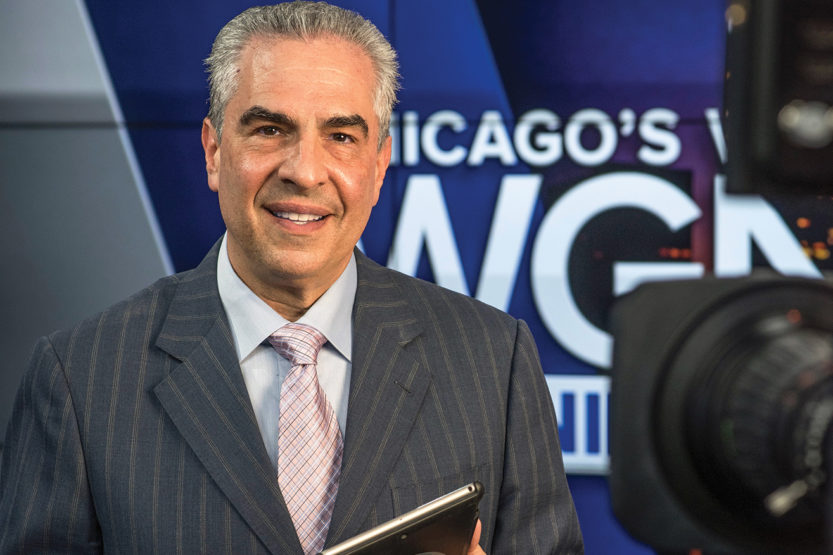Alumni Interview: Paul M. Lisnek
 “If you want to influence the direction of our country, then vote,” advises Paul M. Lisnek, ’80 LAS, ms ’80 LAS, JD ’83, PHD ’83 LAS, who serves as a political analyst for WGN-TV and host of Politics Tonight on CLTV.
“If you want to influence the direction of our country, then vote,” advises Paul M. Lisnek, ’80 LAS, ms ’80 LAS, JD ’83, PHD ’83 LAS, who serves as a political analyst for WGN-TV and host of Politics Tonight on CLTV. During my sophomore year, I had to declare a major, and I had no idea what to do. Since my friends were business majors, I picked accounting. The guidance counselor looked at me and asked, “Do you want to be 60 years old, doing somebody’s taxes? You know you best. You need to pursue your passion.” It was like that line in the play Hamilton: “Don’t throw away your shot.”
I still thought business was my best bet. But on my way to the B-school, I passed Lincoln Hall, home of the Speech Communication department, as it was then called. I stood there like, forever, thinking of my passion for communications. Finally, I went up to Room 244 and registered as a speech communications major. I have never regretted that decision.
I graduated in three years with a double major in speech communications and political science, then went right into the graduate program and became a teaching assistant.
When Professor King Broderick Allen had a heart attack, I took over his Legal Communications course. Within two years, it grew into the second-largest course in the department. The students loved it, and I loved teaching it!
A decade later, after practicing law and teaching, I got into jury consulting, a fascinating field that combines law and communications. For a time, I was one of only a few people in the field who had a communications Ph.D. and a law degree, which put me in a good position: I understood how arguments would play to jurors, and I could talk turkey to fellow lawyers. I was part of a team that worked on many high-profile cases, including the O.J. Simpson, Heidi Fleiss, Phil Spector and Whitewater trials.
During the Simpson trial, I began appearing on television as a legal commentator. Eventually, NBC News contacted me. They said they had heard I was good on TV, and asked if I would like to work with them through the trial. I began to make regular appearances on the Today Show and Nightly News. Before long, WGN-TV anchor Larry Potash suggested [to management] that the station hire me to do political and legal analysis. After two years, just before the Chicago mayoral election in late 2010, WGN gave me my own political show [Politics Tonight]. It was supposed to be a three-month trial, but I’ve been doing it five nights a week ever since.
I get criticism from the left and the right, but as long as it’s in reasonably equal amounts, I think I’m doing my job. In a democracy, we need to hear all sides.
We have a pretty simple format. We invite experts, officials and candidates to talk about city, state and national issues—we’re never at a loss for material.
To be clear, I’m an analyst, not a commentator. I remain neutral, and aim to clarify issues and inform people. I get criticism from the left and the right, but as long as it’s in reasonably equal amounts, I think I’m doing my job. In a democracy, we need to hear all sides.
In 2009, after Barack Obama was elected president, Ill. Gov. Rod Blagojevich picked Roland Burris, a former state official, to complete Obama’s term as U.S. senator. When Blagojevich was accused of corruption, Burris was drawn into the investigation, and even though he was never implicated, he had to face a lot of questions from journalists, me included. One day, I said, “Senator, I’ve got to ask—why do you keep coming on my show?” And he said, “Because you’re fair. You ask tough questions but you always let me answer.” I thought that was a great compliment. I hope all my guests feel that way.
What we’re seeing today is not politics as usual. Partisanship is more intense, and things like Fox News and MSNBC and social media help separate people and keep us in our respective camps. But it’s not just the media that needs to take a look at itself. All Americans need to put country ahead of party regardless of what side of the aisle they line up on.
Many Democrats expect a Blue Wave in the fall. Republicans counter that there will be a Red Wall. I’m not sure which way it will go, but all parties need to have a platform. Protesting is fine, but voting is better. If you want to influence the direction of our country, then vote.

